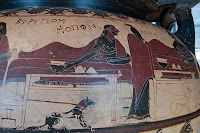As I mentioned last time, I've been re-reading The Lonely American and thinking about the American myth of virtuous independence that the authors criticize.
Rather than focusing on myths detrimental to ancient life, as originally planned, I've decided to follow up with a post on ancient (elite) people and social connections.
Now, I love the Greeks. But it seems to me that the elite Greeks were either overly dependent on family connections, or quarrelsome and backstabbing within their social group.
For example, Agamemnon, as far as I can recall, has no close friends apart from his brother, for whom he harbors an almost smothering affection. Witness his total freakout when Menelaus is slightly wounded in _Iliad_ book 4:
When King Agamemnon saw the blood flowing from the wound he was afraid, and so was brave Menelaus himself till he saw that the barbs of the arrow and the thread that bound the arrow-head to the shaft were still outside the wound. Then he took heart, but Agamemnon heaved a deep sigh as he held Menelaus's hand in his own, and his comrades made moan in concert. "Dear brother," he cried, "I have been the death of you in pledging this covenant and letting you come forward as our champion. ….how, Menelaus, shall I mourn you, if it be your lot now to die? I should return to Argos as a by-word, for the Achaeans will at once go home. We shall leave Priam and the Trojans the glory of still keeping Helen, and the earth will rot your bones as you lie here at Troy with your purpose not fulfilled. Then shall some braggart Trojan leap upon your tomb and say, 'Ever thus may Agamemnon wreak his vengeance; he brought his army in vain; he is gone home to his own land with empty ships, and has left Menelaus behind him.' Thus will one of them say, and may the earth then swallow me."
The symposium ("drinking-together") immediately springs to mind as an example of a later, civilized friendship circle. But there's more to it than intellectual companionship and good times. David Konstan identifies several proverbs that hint at strife and betrayal in the symposium: "He who does not betray a man who is his friend has great honor among mortals and gods, in my judgment"; "If only it were possible to know without being deceived about each man who is a friend what he is like, cutting open his chest, looking into his heart, and locking it up again" (45).
I think the Romans may have done better, but I may be getting that impression simply because Cicero writes so eloquently and frequently about the joys of friendship. That's another post.
Pin It

No comments:
Post a Comment